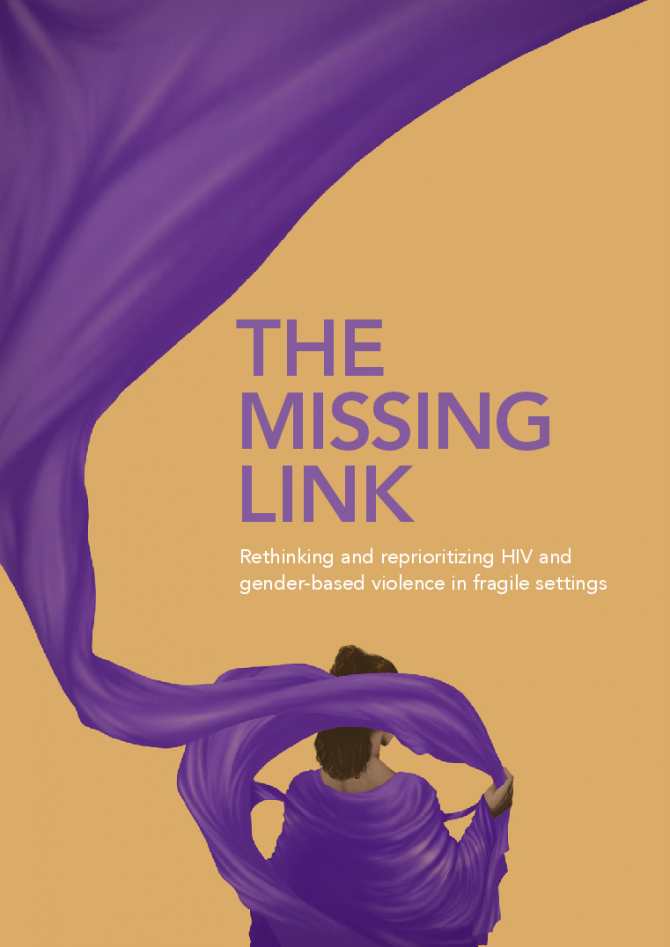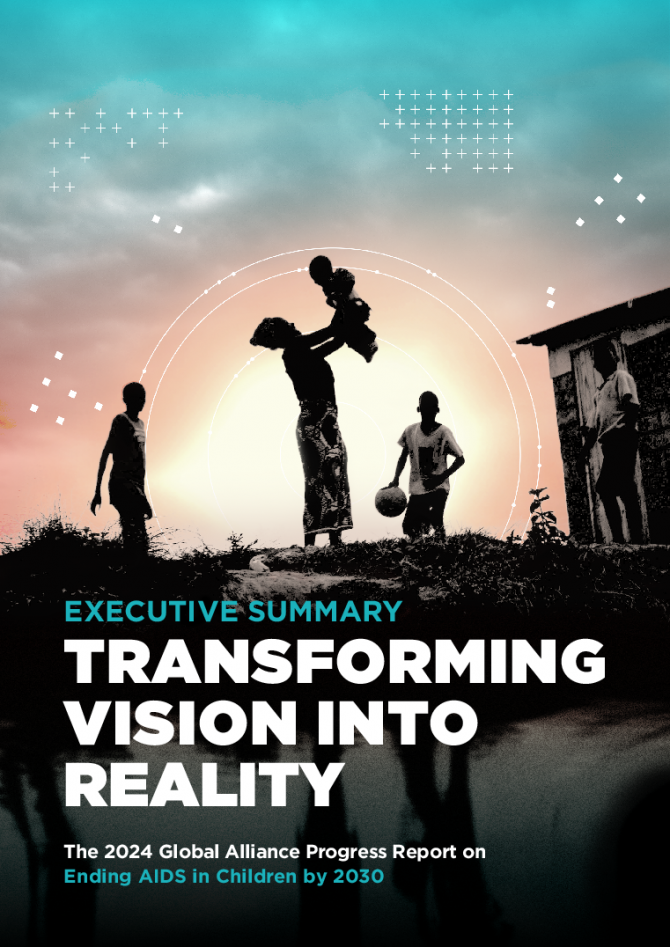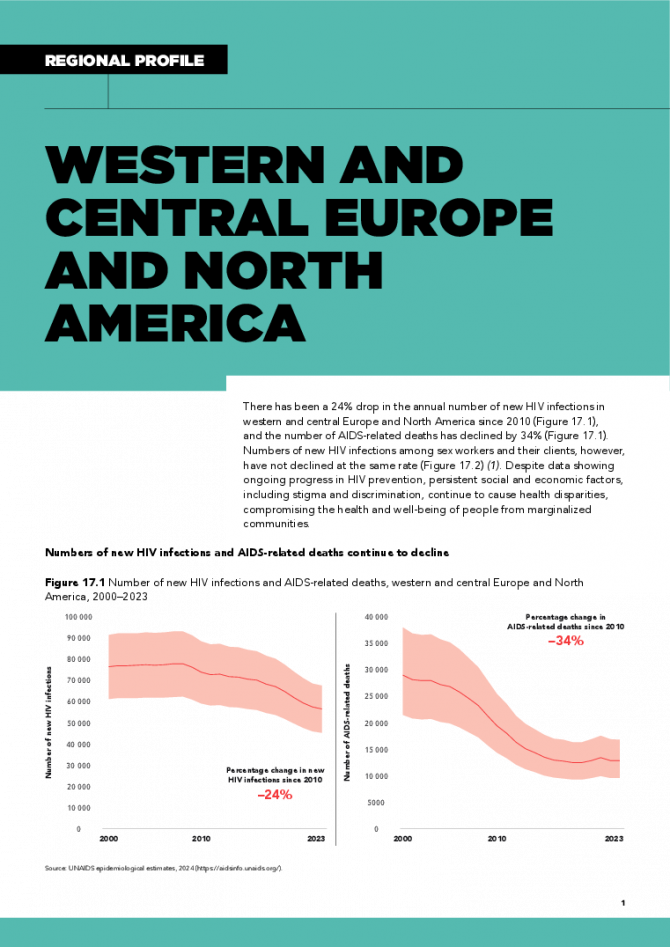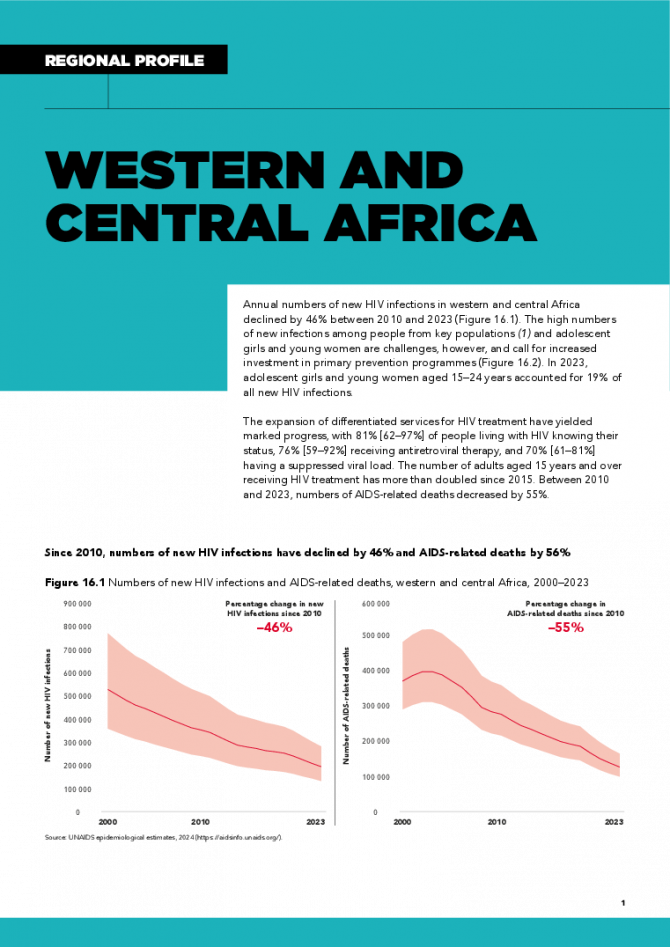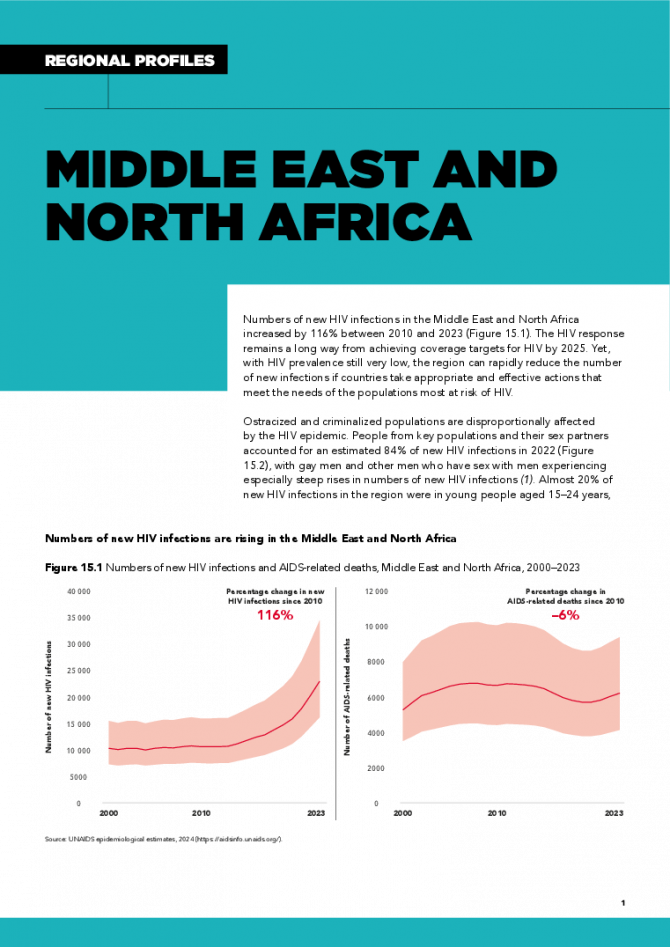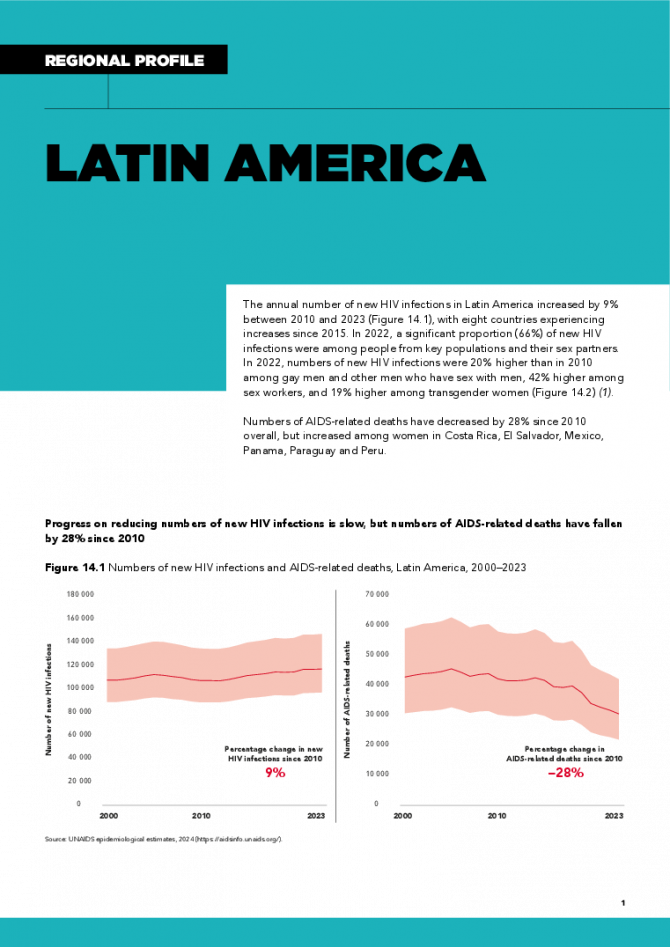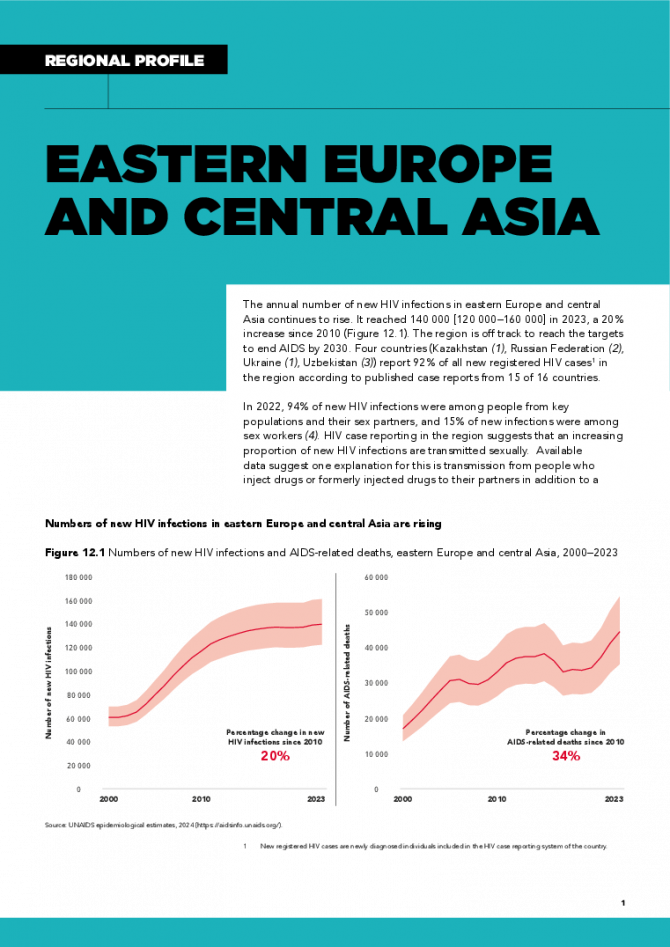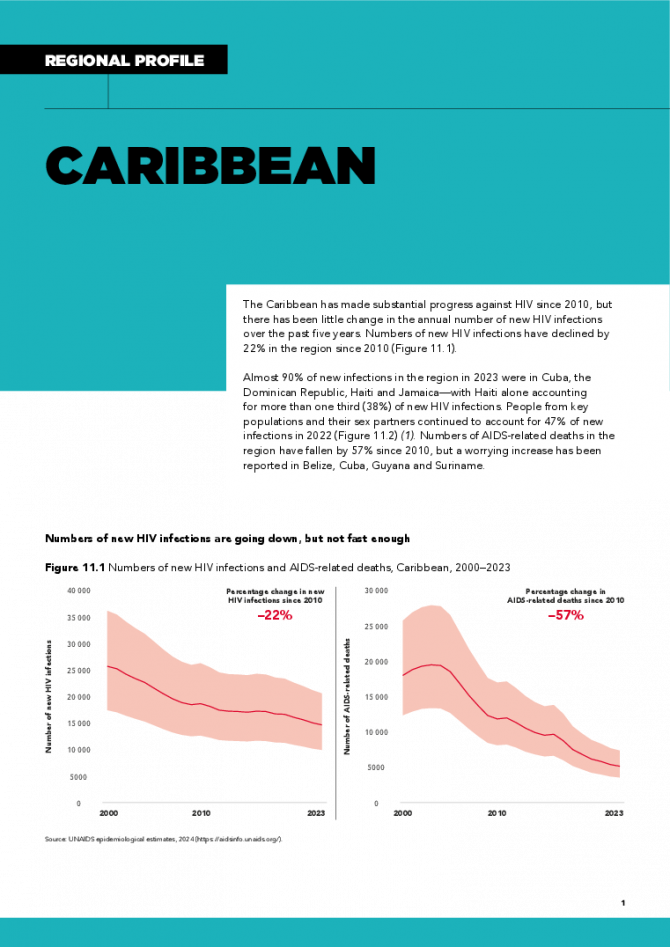Documents
The missing link: Rethinking and reprioritizing HIV and gender-based violence in fragile settings
21 July 2024
This report explores the extent to which evidence, policy, normative guidance and commitments on HIV and gender-based violence, and their interlinkages, is being translated into action on the ground in fragile settings. These issues are explored through the lens of training of peace support operations deploying African troops across Africa and beyond. Translations: français | português | عربي
Documents
Transforming Vision into Reality: The 2024 Global Alliance Progress Report on Ending AIDS in Children by 2030 - Summary
22 July 2024
This status report shows how far we have come—and how much further we must go—if we hope to meet the global commitments to end AIDS in children. It offers a snapshot of global progress and permits an early assessment of the impact of the Global Alliance’s work. This report highlights the transformative work that is being undertaken in Global Alliance countries to accelerate gains towards ending AIDS in children, underscoring the urgent need to apply good practices, emerging innovations and critical lessons learned to overcome the barriers that slow progress. - Português
Documents
Western and Central Europe and North America regional profile — 2024 global AIDS update The Urgency of Now: AIDS at a Crossroads
22 July 2024
There has been a 24% drop in the annual number of new HIV infections in western and central Europe and North America since 2010, and the number of AIDS-related deaths has declined by 34%. Numbers of new HIV infections among sex workers and their clients, however, have not declined at the same rate. Despite data showing ongoing progress in HIV prevention, persistent social and economic factors, including stigma and discrimination, continue to cause health disparities, compromising the health and well-being of people from marginalized communities. Related links: New UNAIDS report shows AIDS pandemic can be ended by 2030, but only if leaders boost resources and protect human rights now | Full report
Documents
Western and Central Africa regional profile — 2024 global AIDS update The Urgency of Now: AIDS at a Crossroads
22 July 2024
Annual numbers of new HIV infections in western and central Africa declined by 46% between 2010 and 2023. The high numbers of new infections among people from key populations and adolescent girls and young women are challenges, however, and call for increased investment in primary prevention programmes. In 2023, adolescent girls and young women aged 15–24 years accounted for 19% of all new HIV infections. The expansion of differentiated services for HIV treatment have yielded marked progress, with 81% [62–97%] of people living with HIV knowing their status, 76% [59–92%] receiving antiretroviral therapy, and 70% [61–81%] having a suppressed viral load. The number of adults aged 15 years and over receiving HIV treatment has more than doubled since 2015. Between 2010 and 2023, numbers of AIDS-related deaths decreased by 55%. Related links: New UNAIDS report shows AIDS pandemic can be ended by 2030, but only if leaders boost resources and protect human rights now | Full report
Documents
Middle East and North Africa regional profile — 2024 global AIDS update The Urgency of Now: AIDS at a Crossroads
22 July 2024
Numbers of new HIV infections in the Middle East and North Africa increased by 116% between 2010 and 2023. The HIV response remains a long way from achieving coverage targets for HIV by 2025. Yet, with HIV prevalence still very low, the region can rapidly reduce the number of new infections if countries take appropriate and effective actions that meet the needs of the populations most at risk of HIV. Ostracized and criminalized populations are disproportionally affected by the HIV epidemic. People from key populations and their sex partners accounted for an estimated 84% of new HIV infections in 2022, with gay men and other men who have sex with men experiencing especially steep rises in numbers of new HIV infections. Almost 20% of new HIV infections in the region were in young people aged 15–24 years, the majority of them male (55%). These epidemic patterns underscore the need for scaled-up HIV interventions for people from key populations and especially young people, and for reducing the societal and structural barriers that limit their access to needed services. Related links: New UNAIDS report shows AIDS pandemic can be ended by 2030, but only if leaders boost resources and protect human rights now | Full report
Documents
Latin America — 2024 global AIDS update The Urgency of Now: AIDS at a Crossroads
22 July 2024
The annual number of new HIV infections in Latin America increased by 9% between 2010 and 2023, with eight countries experiencing increases since 2015. In 2022, a significant proportion (66%) of new HIV infections were among people from key populations and their sex partners. In 2022, numbers of new HIV infections were 20% higher than in 2010 among gay men and other men who have sex with men, 42% higher among sex workers, and 19% higher among transgender women. Numbers of AIDS-related deaths have decreased by 28% since 2010 overall, but increased among women in Costa Rica, El Salvador, Mexico, Panama, Paraguay and Peru. Related links: New UNAIDS report shows AIDS pandemic can be ended by 2030, but only if leaders boost resources and protect human rights now | Full report
Documents
Eastern and Southern Africa regional profile — 2024 global AIDS update The Urgency of Now: AIDS at a Crossroads
22 July 2024
There has been major progress in the HIV response in eastern and southern Africa, the region most affected by the HIV pandemic. The annual number of people acquiring HIV fell by 59% from 1.1 million [880 000–1.4 million] to 450 000 [360 000–580 000] between 2010 and 2023. The number of AIDS-related deaths decreased by 57%, from 600 000 [490 000–770 000] to 260 000 [210 000–330 000] between 2010 and 2023. Despite this overall progress, adolescent girls and young women (aged 15–24 years) still accounted for 27% of new HIV infections and were three times as likely to acquire HIV than their male counterparts. HIV incidence decreased among all key populations from 2010 to 2022 in the region, but at slower rates among gay men and other men who have sex with men and people who inject drugs. It is essential to prioritize increased investment in intensified and more precise prevention efforts. Related links: New UNAIDS report shows AIDS pandemic can be ended by 2030, but only if leaders boost resources and protect human rights now | Full report
Documents
Eastern Europe and Central Asia regional profile — 2024 global AIDS update The Urgency of Now: AIDS at a Crossroads
22 July 2024
The annual number of new HIV infections in eastern Europe and central Asia continues to rise. It reached 140 000 [120 000–160 000] in 2023, a 20% increase since 2010 . The region is off track to reach the targets to end AIDS by 2030. Four countries (Kazakhstan, Russian Federation, Ukraine, Uzbekistan) report 92% of all new registered HIV cases in the region according to published case reports from 15 of 16 countries. In 2022, 94% of new HIV infections were among people from key populations and their sex partners, and 15% of new infections were among sex workers. HIV case reporting in the region suggests that an increasing proportion of new HIV infections are transmitted sexually. Available data suggest one explanation for this is transmission from people who inject drugs or formerly injected drugs to their partners in addition to a growing recognition of transmission among men who have sex with men. Unsafe drug injecting practices are a key factor in the region’s epidemic, representing 27% of new HIV infections. Related links: New UNAIDS report shows AIDS pandemic can be ended by 2030, but only if leaders boost resources and protect human rights now | Full report
Documents
Caribbean regional profile — 2024 global AIDS update The Urgency of Now: AIDS at a Crossroads
22 July 2024
The Caribbean has made substantial progress against HIV since 2010, but there has been little change in the annual number of new HIV infections over the past five years. Numbers of new HIV infections have declined by 22% in the region since 2010. Almost 90% of new infections in the region in 2023 were in Cuba, the Dominican Republic, Haiti and Jamaica—with Haiti alone accounting for more than one third (38%) of new HIV infections. People from key populations and their sex partners continued to account for 47% of new infections in 2022. Numbers of AIDS-related deaths in the region have fallen by 57% since 2010, but a worrying increase has been reported in Belize, Cuba, Guyana and Suriname. Related links: New UNAIDS report shows AIDS pandemic can be ended by 2030, but only if leaders boost resources and protect human rights now | Full report


